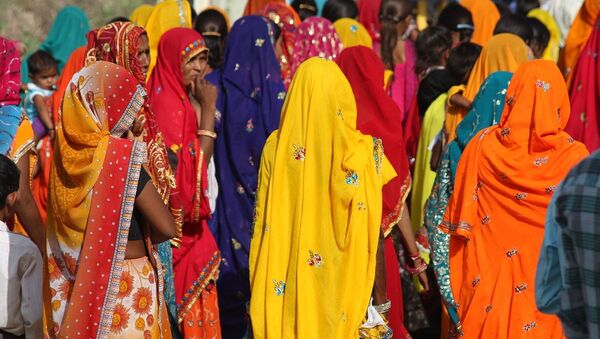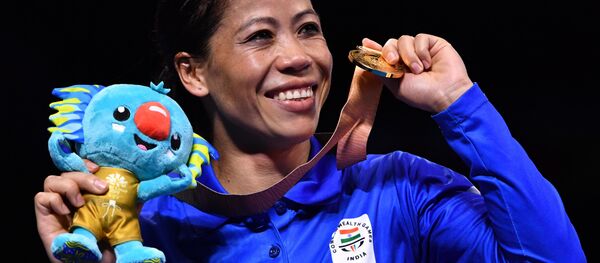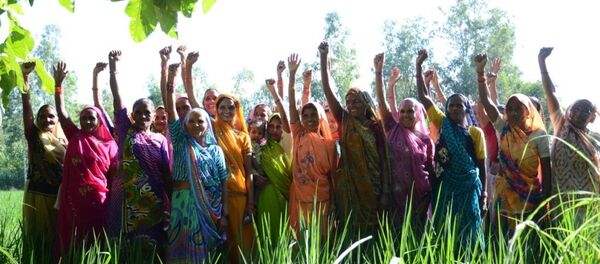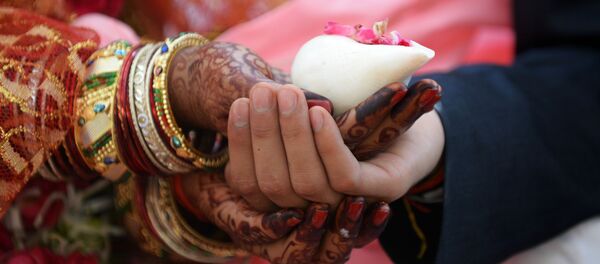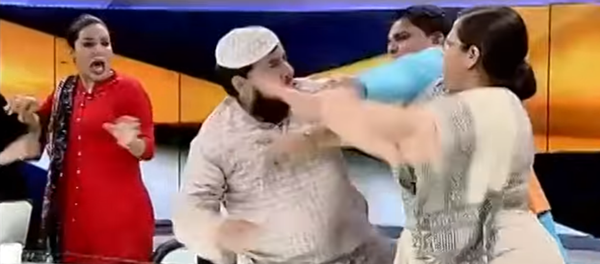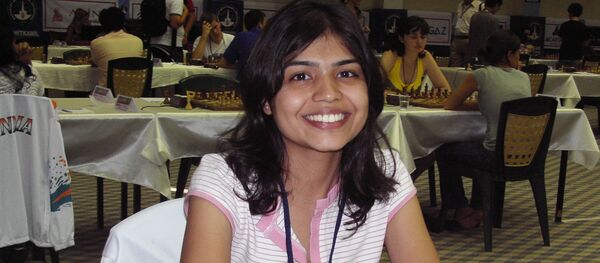Any mention of Indian women evokes images of ethnically dressed, dusky and demure beauties. One might also recall a handful of achievers who've earned international acclaim in fields as varied as modeling and business.
In general, it's perceived that women are marginalized and oppressed in India. This notion is at best incomplete, if not altogether incorrect. The reason is that India is a multilingual and multi-ethnic country, and the socio-cultural frameworks that define the status and identity of women vary across different regions in the country.
A Bengali woman has a different upbringing from that of an Odia woman. A Sikh girl has greater access to resources while growing up than another girl from Uttar Pradesh. A Malayali lady has financial aspirations that are in stark contrast to a different lady from Bihar.
READ MORE: Creating History: India's First Woman Fighter Pilot Flies Solo on MiG-21 Bison
Although most of India follows the patrilineal family system, there are living examples of matrilineal societies in Meghalaya and Kerala. The reality is that any Indian woman faces the same issues as any other woman in the world, be it gender equality or crimes against women. They navigate through their circumstances within the context of their own unique norms and ideologies.
Telugu women, who belong to the Indian states of Andhra Pradesh and Telangana, follow the conservative norms of their predominantly religious society and yet they've achieved empowerment through education and financial independence. Women regularly visit temples and organize prayer functions at home and at the same time they are striding ahead in all professions.
Srilakshmi T.V.N., a technical writer, says that "Telugu women are educated, knowledgeable, enterprising, and bold. Yet the average, that is middle class, Telugu woman is not liberated in the complete sense. They are still rooted deep in patriarchal colors. They also do not openly break social barriers or stigmas. The most prominent thing that I have noticed is that women are largely independent and do what they want, but they do not defy patriarchy in an open and pioneering way. A lot of issues are still taboo, especially in the lower strata. Gender equality is fair in most urban places but has not seeped into the inner circles. Many younger women are breaking out of the older social norms and pursuing careers in all sectors. This is true of the smaller towns too."
Women from Gujarat are inspired to get educated and take equal part in the welfare of their family. Priyanca Vaishnav, an entrepreneur, says "[t]he men of the household actually encourage independent thinking among their women. As a result, Gujarati women adapt easily to eking out their own livelihoods and contributing to the family, fairly and significantly, beyond the usual cooking, cleaning, and raising the children."
READ MORE: Indian Men Take to the Streets Shirtless to Protest Rape (PHOTOS)
Vaishnav says that Gujarati women are capable of donning multiple personalities at once, "One minute, they will seem subservient, and another they will seem self-serving and even [like] terrors. Unlike a Gujarati man, though, the women don't take assaults of any nature lying down. They can be aggressive and retaliatory, not to mention confrontational, unlike the men who will want to sweep it all under the carpet. Gujarati women are not easy to fool. Hardened by the lack of resources in a land not traditionally known to be plentiful, Gujarati women know how to make the most of everything. They are grounded and content, seldom boastful about their or their husband's wealth, or their children's well-being. That said, they know just how to strike the balance between matriarchal dominance, frugal deprivation, and splurging on a good life."
READ MORE: Denied a Job in Air India, Transgender Woman Seeks Mercy Killing
Despite the old-fashioned ideologies, education is stressed upon. "Everyone sends their daughters to schools if nothing else then at least to ensure that they'll be married off well. In olden days girls used to be home tutored, but nowadays everyone goes to school. Several government-run incentive programs have helped, such as offering cycles and scholarships to girls and, of course, midday meals," Sharma says.
Snigdha Samal, a UI consultant, says that "[e]ducated women from Odisha are culturally well aware and carry a strong sense of identity and traditional values. Even when they are not socially or economically emancipated, they tend to have a quiet aggression in them. You'll find the most shy and reserved Odia girl turning out to be fearlessly opinionated and forthcoming. I think this aggression is because subconsciously they try to make up for almost a century of neglect and lack of opportunity. They try hard to make it right for the next generation. So many of the liberated and empowered Odia women you see may have actually hop-skip-jumped many obstacles which their peers from other urban regions in India may not have faced."
Samal describes her mother's struggles, "My mother did not get an opportunity to complete high school but she made sure we all got higher education and continuously pushed us to better ourselves. She grew up in a rural set up in a lower-middle-class farming family. But she was a book lover and used to read whatever she could lay her hands on. The point is despite a limiting world order she was forced in, she managed to find strength and inspiration to give us a worldview that is liberal and human."
READ MORE: Ordinary Women Rise Against Patriarchal Practices in India and Make a Difference
Sundriyal says that she grew up listening to the tales of illustrious women such as Gaura Devi, who was a forest conservation activist, and Bachendri Pal, who was the first Indian woman to summit Mount Everest. "People in Uttarakhand worship Goddess Nanda Devi and it's believed that the Goddess manifests through young girls," Sundriyal illustrates the religious significance of women in the state.
Malayali women, who hail from Kerala, are typically very driven and fearless. Asha Edwin, a UI designer, says that most Malayali women are career oriented, "[w]omen work twice as hard as men. They don't mind living away from their families in an unfamiliar town just so that they can earn a living for their loved ones. Which is why it is not surprising that you see most nurses in hospitals the world over are Malayalis."
Edwin points out that even though Kerala is one of the most literate states in India, yet there are conservative norms for girls. "You don't see any little girls playing outdoors, with boys. Girls usually have a very sheltered upbringing. They go to school and take music or dance lessons. But you don't see them playing freely, say splashing around in the local ponds like young boys," says Edwin.
Anju Vinayan, an officer in a public sector enterprise, adds that Malayali women often manage money matters, "[w]omen manage urgent financial needs, They do the needful to enquire and arrange loans. Husbands happily give such responsibilities to their wives."
READ MORE: Indian State Offers Free Breast Implants for the Poor, Stokes Controversy
Women from Bengal are considered more outspoken and dominating when compared to other states of India. Sunita Chakraborty, who is an instructional designer, says that Bengali women are perceived as such because they are quite vocal in nature. "Women have to make their presence felt to live up to the image of being dominant. However, at home, the man of the house drives all decisions. An ideal Bengali lady is supposed to be doe-eyed, talented at singing, and have great intellectual beliefs about social and political matters. And of course, you should be able to cook the perfect macher-jhol," Chakraborty refers to a Bengali delicacy to underscore the pressure women feel to fit the stereotypes.
"How women are treated at home, depends on the economic and social status of their family. There are no common patterns of gender discrimination otherwise. After all this is a state run by a firebrand woman chief minister who dresses up modestly in white saris and slippers."
READ MORE: Twitter Sees Red as Pakistan Bans Film on Menstrual Hygiene
Rekhi says that the Sikh religion imparts several values that ensure a healthy society and well-rounded individuals. "Our scriptures tell us to accept our bodies as they are. There's a code of conduct against cutting body hair, it's, in essence, a way to ensure body positivity. Sikhism gives the surname 'Singh' to all men and 'Kaur' to all women. This was meant to ensure that there is no caste-based discrimination.
It isn't possible or fair to have a unifying notion about Indian women. The status and identity of women depends on their respective socio-cultural backgrounds. Considering the widely acknowledged diversity of India, these factors vary majorly across regional and ethnic boundaries and are further modified by the extent of urbanization.
The views and opinions expressed in this article are solely those of the speakers and do not necessarily reflect those of Sputnik.
